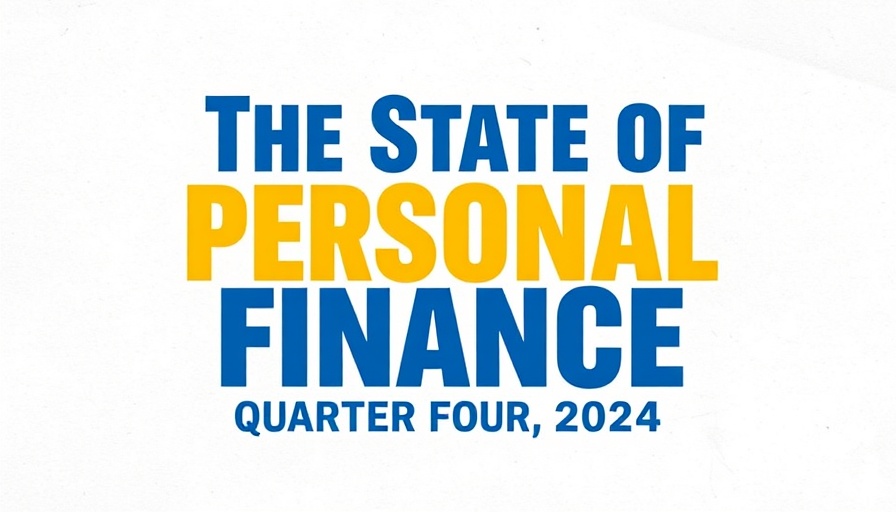
Why Self-Discipline is Key to Financial Success
In today’s fast-paced world, where instant gratification often trumps long-term goals, cultivating self-discipline around money is more crucial than ever. As a family navigating various expectations and responsibilities, understanding your financial motivations can transform not only your relationship with money but your entire lifestyle. It's not about perfect budgets or restrictive spending plans; instead, it’s about constructing a framework where financial discipline can thrive.
Identifying Your Financial "Why"
The first step in this journey is to connect with your financial "why." This is foundational; if your reasons for saving, investing, or budgeting aren't clear, motivation can wane when life gets challenging. Ask yourself: What drives you? Is it the desire for financial security, an education fund for your children, or perhaps the freedom to pursue a passion project? Documenting these reasons and keeping them visible—maybe on your fridge or desk—can be a powerful reminder that shapes your daily financial decisions. When discipline feels purposeful, it transforms from drudgery into a fulfilling practice.
Automation: Making Discipline Effortless
One of the most effective ways to maintain financial discipline is by automating as much as possible. Automated transactions can include savings deposits, bill payments, and even investment contributions. This method reduces the likelihood of spending temptations creeping in during moments of weakness. Essentially, when financial management becomes a default setting rather than a conscious choice, your path to success becomes smoother. This approach particularly benefits families, ensuring vital expenses aren't inadvertently overlooked amid life’s chaos.
Embracing Flexible Spending Rules
Rigid financial rules often lead to frustration and a sense of deprivation. Instead, consider establishing flexible spending guidelines that fit your lifestyle. For instance, decide on a modest allowance for leisure activities—like family outings or personal indulgences—while ensuring essential expenses are covered. This balance allows families and individuals to enjoy life's pleasures without derailing financial goals. As with any discipline, the goal is not perfection but progress.
Weekly Progress Tracking: A Snapshot of Success
Another critical component of financial discipline is the practice of tracking your progress regularly. This doesn’t have to be elaborate. A simple weekly review of income, expenses, and savings can provide insightful feedback on your financial health. Are you sticking to your budget? Are you close to reaching your savings goals? Acknowledging small wins reinforces positive behavior and helps keep your focus sharp.
Removing Temptation: Setting Yourself Up for Success
Another fundamental habit to foster financial discipline is proactively removing temptations. This could mean unsubscribing from sales newsletters, limiting your time on shopping apps, or even establishing boundaries around social activities that encourage excessive spending. By curating environments that support sensible financial decisions, you enhance your chances of sticking to your plans.
Building Supportive Routines for Families
Routines play an essential role in financial discipline. Families can create weekly or monthly money management routines where they sit together to discuss finances, saving strategies, and shared goals. This not only reinforces collective discipline but also allows for open conversations about financial decisions. A supportive atmosphere empowers each family member to engage positively with finances and instills valuable lessons for the younger generation.
Discipline vs. Perfection: A Change in Mindset
As you journey toward financial discipline, it's crucial to understand the difference between being disciplined and achieving perfection. Mistakes will happen, and spending may occasionally exceed planned budgets. This is part of the process. Instead of allowing slip-ups to discourage you, treat them as learning opportunities. By focusing on discipline, you embrace a growth mindset, understanding that financial success is not a sprint but a marathon.
Common Financial Misconceptions: Debunking Myths
In the endeavor to establish financial discipline, many myths can mislead families in today's economy. A prevalent misconception is that financial literacy equates to a strict or unsustainable lifestyle. On the contrary, financial goals can be achieved with enjoyment and fun experiences. Understanding that discipline is a journey allows families to create enjoyable financial plans, promoting both savings and quality family time, such as budget-friendly fun activities.
The Road Ahead
Ultimately, cultivating financial discipline empowers you and your family to make informed decisions while enjoying the present. Embrace the journey ahead, knowing that with each step taken towards discipline, you are reinforcing your financial future. As life changes, remain flexible and consider revisiting your financial strategies to align with evolving goals.
Ready to take charge of your financial journey? Start implementing these habits today for lasting success!
 Add Row
Add Row  Add
Add 




Write A Comment